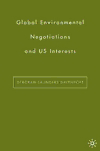
Global Environmental Negotiations And Us Interests PDF
288 Pages·2006·1.168 MB·English
Most books are stored in the elastic cloud where traffic is expensive. For this reason, we have a limit on daily download.
Preview Global Environmental Negotiations And Us Interests
Description:
This book examines the question of why effective action has been taken to ameliorate some global environmental problems while no improvement has been made on others. In an asymmetric international system, success depends upon whether the lead state is willing to manipulate the preferences of other states. This book provides a comprehensive typology of the potential costs and benefits of effective agreement for the system leader and clarifies the leader’s true interests on particular environmental issues.
See more
The list of books you might like
Most books are stored in the elastic cloud where traffic is expensive. For this reason, we have a limit on daily download.
